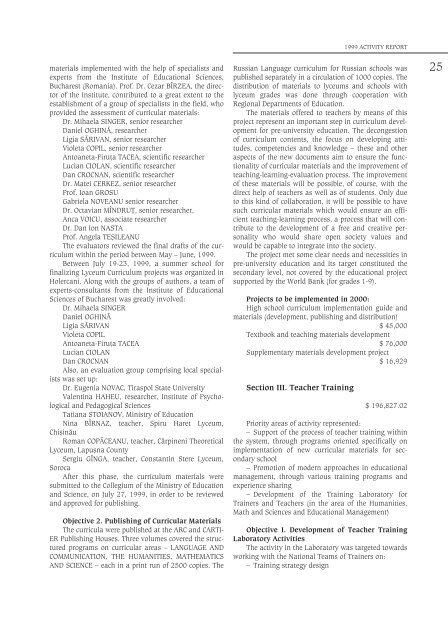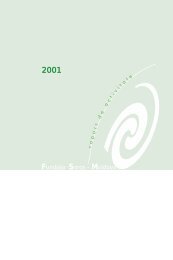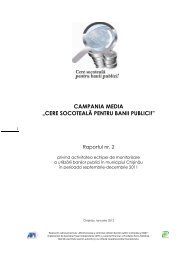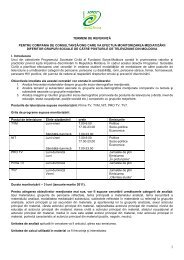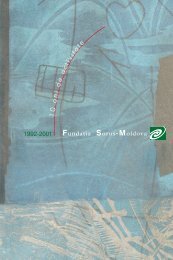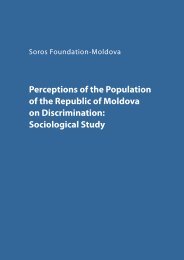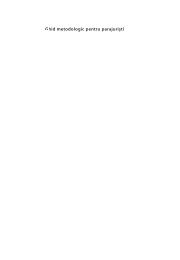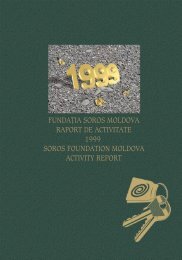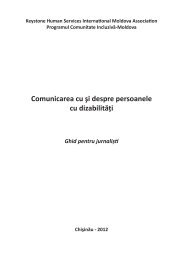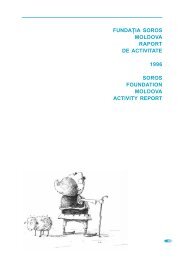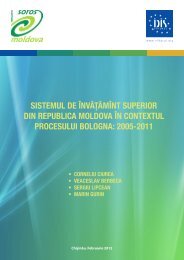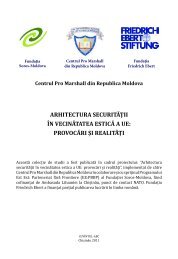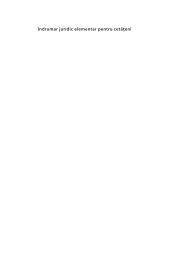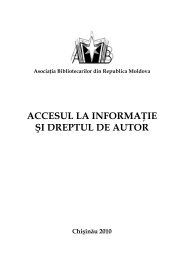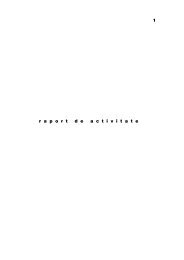Activity report for 1999(PDF) - Soros Foundation Moldova
Activity report for 1999(PDF) - Soros Foundation Moldova
Activity report for 1999(PDF) - Soros Foundation Moldova
You also want an ePaper? Increase the reach of your titles
YUMPU automatically turns print PDFs into web optimized ePapers that Google loves.
materials implemented with the help of specialists and<br />
experts from the Institute of Educational Sciences,<br />
Bucharest (Romania). Prof. Dr. Cezar BÎRZEA, the director<br />
of the Institute, contributed to a great extent to the<br />
establishment of a group of specialists in the field, who<br />
provided the assessment of curricular materials:<br />
Dr. Mihaela SINGER, senior researcher<br />
Daniel OGHINÆ, researcher<br />
Ligia SÆRIVAN, senior researcher<br />
Violeta COPIL, senior researcher<br />
Antoaneta-Firufla TACEA, scientific researcher<br />
Lucian CIOLAN, scientific researcher<br />
Dan CROCNAN, scientific researcher<br />
Dr. Matei CERKEZ, senior researcher<br />
Prof. Ioan GROSU<br />
Gabriela NOVEANU senior researcher<br />
Dr. Octavian MÎNDRUfi, senior researcher,<br />
Anca VOICU, associate researcher<br />
Dr. Dan Ion NASTA<br />
Prof. Angela TEØILEANU<br />
The evaluators reviewed the final drafts of the curriculum<br />
within the period between May – June, <strong>1999</strong>.<br />
Between July 19-23, <strong>1999</strong>, a summer school <strong>for</strong><br />
finalizing Lyceum Curriculum projects was organized in<br />
Holercani. Along with the groups of authors, a team of<br />
experts-consultants from the Institute of Educational<br />
Sciences of Bucharest was greatly involved:<br />
Dr. Mihaela SINGER<br />
Daniel OGHINÆ<br />
Ligia SÆRIVAN<br />
Violeta COPIL<br />
Antoaneta-Firufla TACEA<br />
Lucian CIOLAN<br />
Dan CROCNAN<br />
Also, an evaluation group comprising local specialists<br />
was set up:<br />
Dr. Eugenia NOVAC, Tiraspol State University<br />
Valentina HAHEU, researcher, Institute of Psychological<br />
and Pedagogical Sciences<br />
Tatiana STOIANOV, Ministry of Education<br />
Nina BÎRNAZ, teacher, Spiru Haret Lyceum,<br />
Chiøinæu<br />
Roman COPÆCEANU, teacher, Cærpineni Theoretical<br />
Lyceum, Lapuøna County<br />
Sergiu GÎNGA, teacher, Constantin Stere Lyceum,<br />
Soroca<br />
After this phase, the curriculum materials were<br />
submitted to the Collegium of the Ministry of Education<br />
and Science, on July 27, <strong>1999</strong>, in order to be reviewed<br />
and approved <strong>for</strong> publishing.<br />
Objective 2. Publishing of Curricular Materials<br />
The curricula were published at the ARC and CARTI-<br />
ER Publishing Houses. Three volumes covered the structured<br />
programs on curricular areas – LANGUAGE AND<br />
COMMUNICATION, THE HUMANITIES, MATHEMATICS<br />
AND SCIENCE – each in a print run of 2500 copies. The<br />
<strong>1999</strong> ACTIVITY REPORT<br />
Russian Language curriculum <strong>for</strong> Russian schools was<br />
published separately in a circulation of 1000 copies. The<br />
distribution of materials to lyceums and schools with<br />
lyceum grades was done through cooperation with<br />
Regional Departments of Education.<br />
The materials offered to teachers by means of this<br />
project represent an important step in curriculum development<br />
<strong>for</strong> pre-university education. The decongestion<br />
of curriculum contents, the focus on developing attitudes,<br />
competencies and knowledge – these and other<br />
aspects of the new documents aim to ensure the functionality<br />
of curricular materials and the improvement of<br />
teaching-learning-evaluation process. The improvement<br />
of these materials will be possible, of course, with the<br />
direct help of teachers as well as of students. Only due<br />
to this kind of collaboration, it will be possible to have<br />
such curricular materials which would ensure an efficient<br />
teaching-learning process, a process that will contribute<br />
to the development of a free and creative personality<br />
who would share open society values and<br />
would be capable to integrate into the society.<br />
The project met some clear needs and necessities in<br />
pre-university education and its target constituted the<br />
secondary level, not covered by the educational project<br />
supported by the World Bank (<strong>for</strong> grades 1-9).<br />
Projects to be implemented in 2000:<br />
High school curriculum implementation guide and<br />
materials (development, publishing and distribution)<br />
$ 45,000<br />
Textbook and teaching materials development<br />
$ 76,000<br />
Supplementary materials development project<br />
$ 16,929<br />
Section III. Teacher Training<br />
$ 196,827.02<br />
Priority areas of activity represented:<br />
– Support of the process of teacher training within<br />
the system, through programs oriented specifically on<br />
implementation of new curricular materials <strong>for</strong> secondary<br />
school<br />
– Promotion of modern approaches in educational<br />
management, through various training programs and<br />
experience sharing<br />
– Development of the Training Laboratory <strong>for</strong><br />
Trainers and Teachers (in the area of the Humanities,<br />
Math and Sciences and Educational Management)<br />
Objective I. Development of Teacher Training<br />
Laboratory Activities<br />
The activity in the Laboratory was targeted towards<br />
working with the National Teams of Trainers on:<br />
– Training strategy design<br />
25


